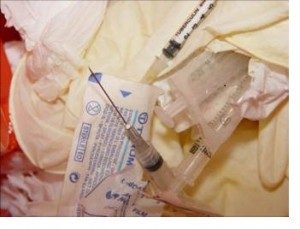Disposal Of Medical Waste Sharps – Maryland – Virginia – Washington DC
 Sharps disposal regulations, looking for information on sharps disposal regulations or the proper disposal of sharps, needle and syringe disposal in your State, such as Maryland or Virginia? Provided here is some general information on proper handling and sharps disposal for your local jurisdiction. In addition you can review your individual State regulations, by choosing your State.
Sharps disposal regulations, looking for information on sharps disposal regulations or the proper disposal of sharps, needle and syringe disposal in your State, such as Maryland or Virginia? Provided here is some general information on proper handling and sharps disposal for your local jurisdiction. In addition you can review your individual State regulations, by choosing your State.
Sharps Regulations, with the improper management of discarded needles and other sharps can pose a health risk to the public and waste workers. For example, discarded needles may expose waste workers to potential needle stick injuries and potential infection when containers break open inside garbage trucks or needles are mistakenly sent to recycling facilities. Janitors and housekeepers also risk injury if loose sharps poke through plastic garbage bags. Used needles can transmit serious diseases, such as HIV, hepatitis and other possible infectious diseases in Virginia, Maryland & Washington DC.
When it comes to Sharps, needles and proper syringe waste disposal and removal, the Coalition for Safe Community Needle Disposal comprised of businesses, community groups, nonprofit organizations, and government, promotes public awareness and solutions for safe disposal of needles, syringes, and other sharps in the community.
The Coalition has identified several types of safe disposal programs for self- injectors. Instead of placing sharps in the trash, self-injectors are encouraged to use any of these alternative disposal methods:
- Drop Box or Supervised Collection Sites Sharps users can take their own sharps containers filled with used needles to appropriate collections sites: doctors’ offices, hospitals, pharmacies, health departments, or fire stations. Services are free or have a nominal fee. Check with your pharmacist or other health care provider for availability in your area.
- Mail-Back Programs Sharps users place their used sharps in special containers and return the container by mail to a collection site for proper disposal. This service usually requires a fee. Fees vary, depending on the size of the container. Check with your health care provider, pharmacist, yellow pages, or search the Internet using keywords “sharps mail back.”
- Syringe Exchange Programs (SEP) Sharps users can safely exchange used needles for new needles. Contact the North American Syringe Exchange Network at (253) 272-4857 or online at www.nasen.org
- At-Home Needle Destruction Devices Several manufacturers offer products that allow you to destroy used needles at home. These devices sever, burn, or melt the needle, rendering it safe for disposal. Check with your pharmacist or search the internet using keywords “sharps disposal devices.” The prices of these devices vary according to product type and manufacturer.
For more information:
- Call your local solid waste department or public health department to determine the correct disposal method for your area.
- Ask your health care provider or local pharmacist if they offer disposal, or if they know of safe disposal programs in the area.
- Contact The Coalition for Safe Community Needle Disposal at (800) 643-1643. Ask about the availability of safe disposal programs in your area or for information on setting up a community disposal program. Visit the States page of EPA’s Wastes Web site for links to state health and solid waste/sanitation department contacts.
- Visit the Center for Disease Control’s Safe Community Needle Disposal Web site. This easy-to-use Web site is designed for anyone interested in safe needle disposal. It provides state-by-state and territory-by-territory summaries of the laws and regulations affecting the labeling, transportation, and disposal of used needles and other sharps in the community.
If you still need more information on Sharps Disposal Regulations, contact your local health department or medical waste disposal Transporter Company for help.

